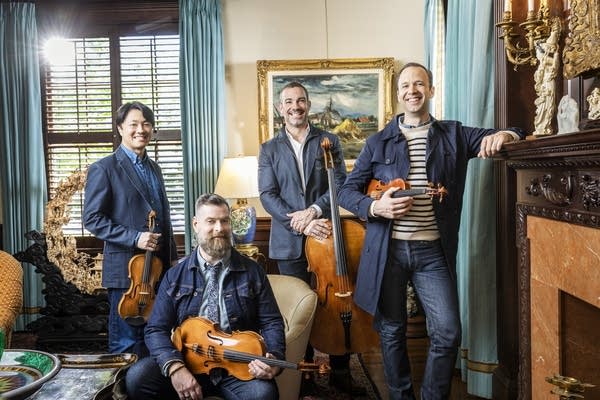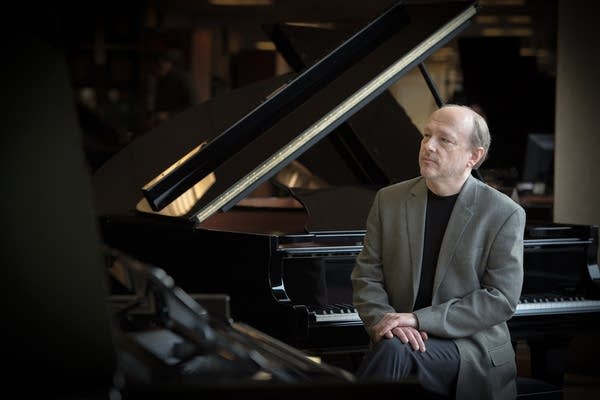Osmo Vänskä/Minnesota Orchestra – Mahler: Symphony No. 9 (BIS)
In the past few months, Osmo Vänskä has conducted from a wheelchair, a stool and now, finally, standing up after suffering a bad fall and shattering his pelvis. There’s a lot of metal keeping him going, he says, and that’s another reason he’s decided his motorcycling days are over.
“I have decided to sell it, because I’m now 70, and I’ve had enough miles with the motorcycle,” he says. “… It will go to the Symphony Ball auction this June. I don't want to have anymore stupid risks in my life.”
Vänskä has been a music director for almost 40 years. Nineteen of those years were with the Minnesota Orchestra. Recordings he made with the orchestra are still being released, and the latest features Gustav Mahler’s Symphony No. 9.
What makes Mahler's Symphony No. 9 so powerful?
“[The piece was composed] at the time when his daughter had died, and Mahler knew in his heart that there was something wrong. He thought he was coming to the end of his life. And even though he wrote about the world and about life when he was younger, those pictures were different than when he was an older composer. Death is much closer to this music. It’s a question about the whole life, the whole world, whatever those thing include.”
Mahler was a conductor as well as a composer. Are you seeing something in the score that makes his intentions clearer because he’s so well versed in both of those roles?
“It means for me that I have to take what he wrote very seriously. He's giving a lot of instructions in this score. Technically speaking, I don’t need to add anything to the score. I just try to do what he wrote there, and in my experience, that is how it works. But then it comes to the point where technical things are not the final say in the music. The final say is what my heart and the hearts of the players are telling them when they are playing this.”
Can you give me an example? Is there a spot in this performance with the Minnesota Orchestra, with you conducting, where you followed your heart?
“From the first bar until the last bar. There is not one bar that is done without emotional feeling, not one bar that is done without the heartbeat and the understanding that comes from the music about life, about the world.”
Mahler's protégé, Bruno Walter, conducted the premiere of this symphony over a year after Mahler died. Walter said that as he studied the score, he recognized the way that Mahler walked, his gait, in some of the limping rhythms of the first movement. And then, later, Leonard Bernstein said that it could have been Mahler's irregular heartbeat. What do you hear in that first movement?
“I think both are right. And I believe that the reason why we like that music is because those details could be about our lives, too. I can easily say right now, after my accident, that I have much more understanding about people who cannot move, especially when I was in my wheelchair on the streets. It's difficult to go because the streets are not made for people who are using wheelchairs, those kind of things. And I also understand that I was very close to dying.
“We all have our dark moments, and we all have our hope, and then we are thankful and think, ‘Wow, this is a new chance.’ That is all coming from Mahler’s music. He sent a message about his life.”
To hear the rest of my conversation, click on the extended interview above, or download the extended podcast on iTunes or wherever you get your podcasts.
Resources
Osmo Vänskä and Minnesota Orchestra — Mahler: Symphony No. 9 (Amazon)
Osmo Vänskä (Minnesota Orchestra official site)
Minnesota Orchestra (official site)
Love the music?
Show your support by making a gift to YourClassical.
Each day, we’re here for you with thoughtful streams that set the tone for your day – not to mention the stories and programs that inspire you to new discovery and help you explore the music you love.
YourClassical is available for free, because we are listener-supported public media. Take a moment to make your gift today.
Your Donation
About New Classical Tracks®
Host Julie Amacher provides an in-depth exploration of a new classical music release each week.
Subscribe on Apple Podcasts, TuneIn, Radio Public, or RSS.










